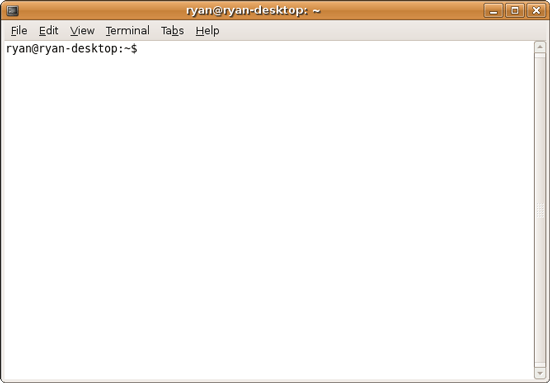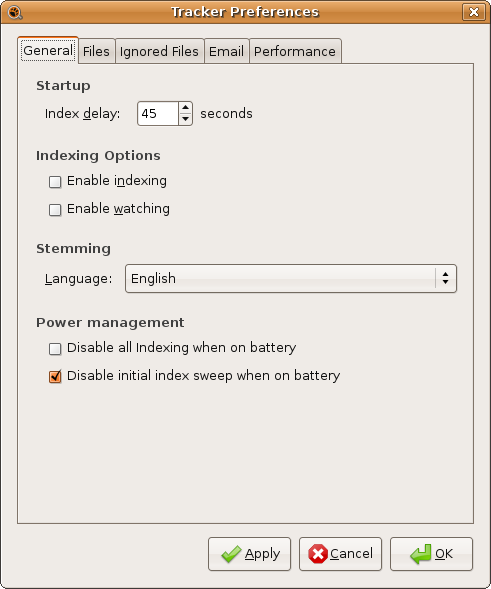Revisiting Linux Part 1: A Look at Ubuntu 8.04
by Ryan Smith on August 26, 2009 12:00 AM EST- Posted in
- Linux
The User Experience
Now that we’ve had a chance to go over the various features of Ubuntu and its included applications, we can get to the burning question: how is it?
In a nutshell, my own experience with Ubuntu has been that it’s capable of meeting 95% of my daily needs, and 75% of my weekly needs. Outside of the lack of the ability to sync my iPhone (which again is Apple’s fault), on any given day I did not need to boot up Windows. However in any given week I would need to boot in to Windows upwards of several times to run various Windows programs that don’t work under Wine or have a doppelganger for Ubuntu, not counting Windows games which also required booting back in to Windows. The result was that there was more dual booting than I would have liked, but it was acceptable.
What worked best for me under Ubuntu were the most common tasks, which makes sense given Ubuntu’s focus. We’ve already hit on how great Firefox is under Ubuntu, but also music playback, email, and word processing worked well. There was never any point where I felt like I could absolutely not accomplish something related to these tasks when using Ubuntu. However with that I will put the disclaimer that I didn’t find Ubuntu to be significantly better at any of these tasks – it was merely good enough.
If this sounds boring, it is. There’s not a lot to be said about otherwise mundane things that work well. Windows and Mac OS X could do these things, and so could Ubuntu. The distinguishing factor here really isn’t functionality; it’s that all of this was free.
In many situations Windows would still offer a better experience than Ubuntu. Sometimes this is a more polished GUI, as it is Ubuntu often looks like an orange version of Mac OS 9 (the bad Mac OS). Other times this would come down to professionally developed programs having an extra feature or two that while not critical, were nice to have. There are numerous little things like these that still keep Ubuntu well-separated from Windows and Mac OS X.

One item where I feel Ubuntu failed in particular is CLI use, which was a condition I outlined earlier. I wasn’t able to avoid using the CLI under Ubuntu, in fact I didn’t even come close. Some of this comes down to the fact that user generated support often uses CLI commands in lieu of instructions for dealing with the GUI, and in other situations such as mounting ISOs and installing video card drivers the situation was completely unavoidable. These are correctable problems.
Along those lines the default configuration of Ubuntu leaves me scratching my head. For example, Ubuntu has a file indexer and search system ala Windows Search and Spotlight. For whatever reason this indexer is not enabled by default and as a result it’s quite easy to miss. By the same token Compiz defaults to not using v-sync, which means windows will tear when moved. This is something hardware accelerated compositing specifically exists to solve. These items, along with finding a way (any way) to install the Microsoft Core Fonts by default so that the font disparity no longer exists would make the initial experience a better one.

The biggest negative influences in the Ubuntu experience were the items we listed under Things That Went Wrong. It’s easy to pick at things that don’t work, but these also happen to be the things that drove me out of Ubuntu for that moment. Meanwhile the biggest positive influences come down to Firefox and Totem. Neither is perfect, but as I discussed in their respective sections they’re great programs that are much better than the default programs found with Windows and Mac OS X.
Overall I found the Ubuntu experience to be decent, but not spectacular. Next to any issues listed out above, there’s a general lack of killer applications. As a result unless you specifically value the fact that it’s free (in either sense of the word) or the security benefits of it not being Windows, then there’s really nothing there that makes Ubuntu compelling compared to Windows or Mac OS X.










195 Comments
View All Comments
Telkwa - Wednesday, August 26, 2009 - link
Nobody's going to agree with the entire article. I'm just glad to see Anandtech paying some attention, and would welcome any articles, tests, reviews, etc.It's embarrassing to visit the "Linux" tab and see the latest article was posted in July of 2005...
Geraldo8022 - Wednesday, August 26, 2009 - link
This is based on Ubuntu and I installed it this past weekend. I am having certain issues with it. Yes, it is free. Overall I like it very much and am pleasantly surprised. But, this has shown that Windows 7 will be a comparative bargain to me. I do not have the time to sit in front of the computer and play with Linux; trying to find out why certain videos don't play and why I am having eye strain and clicking on an audio link that doesn't play and a few more. When I go to the Mint forums I am confronted with a Tower of Babel what with all of the acronyms, and told to go to the terminal and type $surun%(8#**#. Ok, now turn your head and cough.I'll keep Linux on this machine to boot up and play with now and then. It beats solitaire for the time being.
VooDooAddict - Friday, August 28, 2009 - link
You hit on a good point. People I've setup with dual booting linux distros and windows begin to appreciate what they are paying for with windows. Typical response is "This is cool (Ubuntu) and I can see why some people like it. But I'm going to stick with windows, it's worth the money to me."They appreciate that Linux could work, but see the "value" in paying form something familiar.
VooDooAddict - Friday, August 28, 2009 - link
I run Vista on my main PC. Vista on all the spare LAN gaming PCs. I have an Ubuntu 9.04 VM and Ubuntu Netbook Edition on my old tablet PC (small and netbook like).Locutus465 - Wednesday, August 26, 2009 - link
Just out of curiosity what user mode were you having guests run in? Even in vista I don't provide anything greater than standard user. With that guests need my password (which they don't have) to mess my machine up. Going back as far as Windows 2000, as long as you pair Windows with good spyware (spybot, or for XP defender if you choose) and antivirus (I like Avast and AVG both free and have nil footprints) you basically don't have to worry about system security as long as the person is running a standard user account.My my parents system, we went from having to wipe and reinstall windows every time I came home from college, to a rock solid system that absoultly never failed when I performed these steps. I still like the XP/2000 behaviour of simply denying access better than the current UAC implementation. But Vista 64 + UAC (active) seems to be secure enough, particularly when paired with the aformentioned anti-virus software.
Ryan Smith - Wednesday, August 26, 2009 - link
For what it's worth, it's an admin account. I know, I know, I could do Limited User. But that tends to just elicit complaints. XP's Limited User mode is embarrassing compared to how well Vista/Win7 does it.Since it's basically just a web browsing laptop anyhow, it's basically a perfect fit for Ubuntu since I wouldn't need to be concerned with Windows malware period.
leexgx - Wednesday, August 26, 2009 - link
i have to agree even XP in its standered/limited user account mode quite hard for stuff to install but not imposable (Vista and win7 with UAC on and an standered account with the admin account passworded should prevent the system from been messed up)aguilpa1 - Wednesday, August 26, 2009 - link
It seems the OS does not like core 2 duos and nvidia 9800GTX graphics, something even OSX was able to handle.samspqr - Wednesday, August 26, 2009 - link
* for me, the best possible way to install applications on any OS, but specially in one that is free (libre) is as follows: you search on the internet for the best program to meet your needs, you find it, you copy some code that identifies it, and paste that in your package manager, which then connects to some database, checks that the program is not malware, looks for the latest version, and proceeds to download and install it, not caring whether it's open source or not; this would beat windows/OSX by a wide margin, and also the current ubuntu system, whose "we don't like this software, on philosophical grounds, so it's going to be a pain in the ass for you to install it" attitude is a bit too problematic* it would be nice if the "auto" option in the installer told you what it's going to do with your hard disk before going on to do it; I never use it, out of fear it might try to do something I don't like
* I missed some comment on that section on how Photoshop CS3 costs a lot of $$$, while GIMP is free
* along these lines, the comparison of total costs in time and money of installing windows/OSX/ubuntu, with all their companion programs, is striking
samspqr - Wednesday, August 26, 2009 - link
and about openoffice:* I didn't check this ltely, but aren't there still problems with VBA compatibility? if I can open my xls/xlsm files but I can't run my macros, it's no good; I have a ton of stuff written in VBA, and I'm definitely not doing all that work again
* the ribbon UI in office 2007 is a royal pain: it's only good for the "It looks like you're writing a letter" users, and you can't get rid of it; there's a lot of people doing real work on excel, and none I talked to likes that ribbon thing, they'd all rather stay with excel 2003